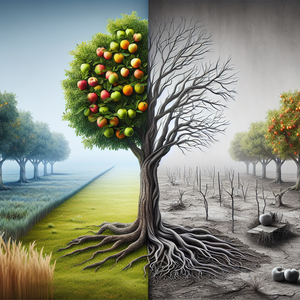The Power of Branding: How Simon Cowell Reinvented Talent Shows

At the heart of Cowell's success lies his innovative approach to branding. When Cowell first entered the talent show arena, he recognized the potential for a more polished, professional product that could attract larger audiences. Shows like “American Idol” and “The X Factor” were not just competitions; they were well-packaged brands that generated excitement and anticipation.
Creating a Distinctive Format
Cowell understood that the format of a talent show needed to be distinctive to stand out in a crowded television landscape. He incorporated elements such as celebrity judges, live performances, and audience participation to create a viewing experience that was interactive and engaging. This approach drew viewers in and encouraged them to invest emotionally in the contestants' journeys. For example, the live audience voting in “American Idol” not only made viewers feel like they had a stake in the outcome but also bolstered viewer engagement and ratings.
Leveraging Celebrity Culture
By enlisting well-known personalities as judges, Cowell capitalized on their fame to attract viewers. The combination of their star power with the raw talent of contestants created a compelling dynamic that kept audiences coming back for more. The presence of celebrities like Paula Abdul, Simon Cowell himself, and later Katy Perry and Lionel Richie on “American Idol” ensured that the show remained in the public eye, generating substantial media buzz and enhancing the brand's popularity.
Emphasizing the Emotional Narrative
Cowell has a unique talent for storytelling, turning each contestant’s journey into a compelling narrative. By emphasizing the personal struggles and triumphs of contestants, he created an emotional connection with viewers. This narrative-driven approach not only made for great television but also fostered a loyal fan base that felt invested in the outcomes. For instance, the backstory of contestants overcoming adversity resonated with viewers, resulting in increased emotional stakes and viewer loyalty.
Financial Success and Revenue Streams
Cowell’s branding strategies did not just change the face of talent shows; they also led to significant financial success. The commercial viability of these shows is a testament to Cowell’s business acumen.
Merchandising and Licensing
Shows like “The X Factor” have generated millions through merchandise sales and licensing deals. From albums featuring contestants' performances to branded merchandise, Cowell capitalized on the show’s popularity to create additional revenue streams. For example, the release of compilation albums often performed exceptionally well on music charts, further enhancing the brand's reach.
International Adaptations
Cowell’s branding success led to the international adaptation of his formats. “The X Factor” and “Got Talent” franchises have been reproduced in numerous countries, each generating substantial income through advertising and sponsorships. This global reach has turned Cowell’s creations into multi-billion dollar franchises. Countries like the UK, Australia, and even India have adapted these shows, showcasing their universal appeal.
Digital and Streaming Platforms
In recent years, Cowell has embraced the digital landscape, recognizing the shift in how audiences consume content. By creating partnerships with streaming platforms, he has ensured that his shows remain relevant in the digital age, generating revenue through online viewership and subscriptions. Shows like “Britain's Got Talent” and “American Idol” have made their way to platforms like Hulu and Peacock, allowing fans to binge-watch seasons and thereby expanding their audience.
Simon Cowell’s impact on the entertainment industry is undeniable. Through his innovative branding strategies, he has transformed talent shows into major cultural events that resonate with audiences worldwide. By creating a distinctive format, leveraging celebrity culture, and emphasizing emotional narratives, Cowell has not only captured viewer interest but has also built a financial empire that showcases the power of branding in entertainment. As talent shows continue to evolve, Cowell’s legacy serves as a reminder of the profound influence that one individual can have on an entire industry. In a world where first impressions matter, Cowell has taught us the value of a strong brand, ensuring that talent shows remain a vital part of our cultural fabric for years to come.
Talent Show Producer
FremantleMedia, ITV
Job Responsibilities
Oversee the development and execution of talent show formats, including casting, scheduling, and content creation.
Collaborate with directors and writers to shape the show's narrative and ensure alignment with branding goals.
Required Skills
Strong project management
Creativity in storytelling
Understanding of audience engagement strategies
Brand Strategist for Entertainment
NBCUniversal, Sony Music
Job Responsibilities
Develop and implement branding strategies that enhance the visibility and appeal of talent shows and associated media.
Conduct market research to identify audience preferences and trends, leveraging insights to inform marketing campaigns.
Required Skills
Background in marketing
Excellent communication skills
Experience with digital marketing tools
Knowledge of consumer behavior in the entertainment sector
Audience Engagement Manager
Endemol Shine Group, ViacomCBS
Job Responsibilities
Design and execute strategies to enhance viewer interaction across various platforms, including social media and live events.
Analyze viewer feedback and ratings to tailor content and improve audience experiences in real-time.
Required Skills
Experience in social media marketing
Data analysis
Event coordination
Familiarity with platforms like Twitter and Instagram
Casting Director for Reality Television
ABC, Fox
Job Responsibilities
Source and audition talented individuals for reality and talent shows, ensuring a diverse and compelling contestant lineup.
Conduct interviews and screen tests, assessing candidates' appeal and potential for audience connection.
Required Skills
Strong interpersonal skills
An eye for talent
Experience in the entertainment industry
Digital Content Strategist
Warner Bros., Netflix
Job Responsibilities
Create and manage digital content strategies that promote talent shows across multiple online platforms, including streaming services and social media.
Collaborate with production teams to develop engaging digital content that resonates with target demographics.
Required Skills
Background in digital marketing
Content creation
Analytics tools
Experience with platforms like YouTube and Twitch


